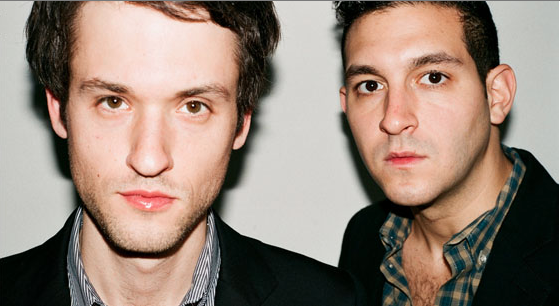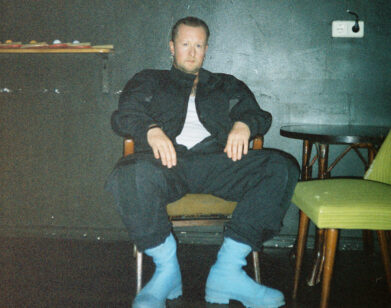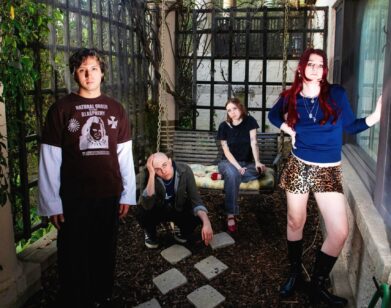Holy Ghost! is at Home

ABOVE: HOLY GHOST
Holy Ghost! doesn’t have a shtick. They’re just a couple of guys who work hard—and, in the process, have become a welcome anomaly in the modern electronic music scene. They’re a Brooklyn band that doesn’t obsess over their image; they’ve bucked the trend of releasing “exclusive” remixes daily and instead take time to work on cohesive albums; and despite falling under the dance music umbrella, they’re miles away from the chart-topping “live your life” chant-alongs that are all but ubiquitous on pop radio. Following in the footsteps of heroes like the Talking Heads, they add some substance where listeners aren’t exactly accustomed to hearing it.
By blending upbeat instrumentation with soulful, distanced lyrics, Holy Ghost! at times symbolizes a generation of lost and lonely adolescents, but more specifically defines the identity of the city they so proudly represent—Brooklyn. It’s only fitting, then, that for New Year’s Eve, they’re coming home to play with their friends, for their friends, at Brooklyn Bowl. The show, which they helped curate, will feature Midnight Magic as openers and DJ Matt Cash playing between sets.
Taking a break from recording their follow-up to their 2011 self-titled debut, we sat down with New York natives Nick Millhiser and Alex Frankel to talk about the new album, New Year’s, and whether or not Brooklyn is dead . . . yet.
DAN BUYANOVSKY: How’s the new album coming along?
NICK MILLHISER: It’s good. We first started writing in June or July of last year. We had some time in between tours, so we booked a month at DFA’s studio, then we didn’t really get to start working on it again until this past January, then it was on and off for a little while, but for the past few months it’s been pretty much nonstop.
BUYANOVSKY: During the break from touring, have you guys been DJ’ing at all?
MILLHISER: Here and there. I mean, we’ve been trying not to travel as much as possible so we can finish the record. We were just in Mexico City, then LA, but those were our first live gigs and DJ gigs in a while. Other than that, just New Year’s.
BUYANOVSKY: After putting out a record and touring with it, does DJing affect your sound and the way you make new music?
ALEX FRANKEL: I’d say that playing live influences our sound more. We hadn’t really toured as a live band until this record, so playing live made us realize what stuff is more effective in that context.
BUYANOVSKY: I was recently talking to a friend who used to promote shows in Williamsburg before moving to Chicago a few months ago. When I asked him why he moved he said that “Brooklyn is dead.” Does that mean anything to you guys?
MILLHISER: I always say that New York is never as good as it was 10 years ago. If you ask anybody, at any given moment in history . . . If you ask somebody in 1990 if New York is dead, they’ll be like, “Oh man, you should’ve been here in ’80!” If you ask someone now, they’re like, “Oh man, you should’ve been here in 2000!” I don’t know. [pauses, looks around] I mean, look at us. This wasn’t here 10 years ago. It’s definitely dead in the sense that it’s no longer an affordable artist’s haven, but I’m not going anywhere anytime soon. I mean, it’s still New York City—which is the best city in the world. It’s also the best city in the world to just get shit done. You can do anything. The resources of the city and the work ethic of New Yorkers is just—
BUYANOVSKY: You can always find somebody who can do something that you need done—
MILLHISER: Totally.
FRANKEL: That’s actually the first line of the new single. “Brooklyn is dead.” But it’s not actually serious—
BUYANOVSKY: But it’s funny to say something like that, then just move away to Chicago—
FRANKEL: [laughs] Yeah. I mean, if you want to see dead, move away.
MILLHISER: If you want to see dead, fuckin’ visit Chicago in the winter. [laughs]
FRANKEL: That was actually on the cover of New York Magazine, too — “Brooklyn is Over” — the same week the single came out. We don’t actually feel that way, though.
MILLHISER: I’m just not even sure what that means.
FRANKEL: It just sounds… bitchy.
BUYANOVSKY: It’s a dramatic line, for sure.
FRANKEL: [laughs] Exactly. I think it was “Soho is Dead,” a few years ago, then they updated it.
BUYANOVSKY: Places just keep dying.
MILLHISER: Flushing is dead. [laughs] Corona is dead.
BUYANOVSKY: Anyway, you guys have a New Year’s show coming up at Brooklyn Bowl. Since it’s at a bowling alley, and it’s a concert more than it is a party, the night strikes me as a sort of alternative New Year’s party, for an alternative crowd. What do you guys expect the night to be like?
MILLHISER: I think it’ll be fun, hopefully. For the past two or three years we’ve DJ’d New Year’s Eve at the Standard, which is a really fun party, but being in Manhattan and living in Brooklyn on New Year’s Eve is just brutal. So I think Alex and I both, initially, we just didn’t want to do anything unless it was walking distance from our houses. Then that offer came up, and it seemed like a good opportunity to do something fun with friends. So we were like, “We’ll do it, if we can get Midnight Magic to open and a friend to DJ.” So I think it’ll be fun for the people in attendance, but it’s also kind of selfish.
BUYANOVSKY: It’s like a house party that you’re curating.
MILLHISER: Yeah. Like, I would like to spend my New Year’s Eve watching Midnight Magic.
BUYANOVSKY: You guys seem to keep a pretty low public profile. I know that you tweet, but it’s usually about shows and events. Do you feel any pressure as a modern artist to be accessible and maintain an internet presence at all times?
FRANKEL: I think that there are some people that are really good at Twitter — largely comedians —
BUYANOVSKY: [DJ] A-Trak is pretty great.
FRANKEL: A-Trak, sure. He’s the world’s greatest tweeter, apparently. But most people, it’s just awful drivel. I don’t think I’m drivel, but I’m not A-Trak, so I just stick pretty much to the basics. [pauses] I like Instagram, but mostly for pictures of synths, or of us recording.
BUYANOVSKY: I feel like you have to devote a lot of energy to tweeting. Or maybe it just comes naturally to some people.
FRANKEL: Yeah, we’re just not really branders.
MILLHISER: I think it works really well for some people. Like for someone like A-Trak, it makes sense for someone with his personality. But, generally speaking, as a fan of music, as tempting and cool as it seems for people that I like to be so accessible — I really don’t want to know too much about them. Like, Twitter and Facebook, in music and beyond music, have kind of ruined the mystery, to an extent.
BUYANOVSKY: Are you aware of any public image you guys have, as a group?
FRANKEL: I’ve always assumed that we don’t have much of a public image. We don’t have a shtick. There’s no gimmick, really. And I’m not saying it’s a bad thing, but like, Chromeo has a shtick. A-Trak has a shtick. There’s an element of comedy there, and we just don’t have it. Either we’re not good-looking enough, or we’re not funny enough, or we’re just not hammy enough.
MILLHISER: “Shtick” kind of a loaded term.
FRANKEL: I don’t mean it in a negative way. I mean, Dave [1, of Chromeo] would be the first to say, “Yeah, we have a shtick.”
BUYANOVSKY: It’s more of an image thing. Like, A-Trak always wears his fedora. Or another guy always wears a snapback. But you have to do that for like six years, then finally someone will be like, “Hey, that’s the guy who wears the snapback!”
FRANKEL: Right. And there are New York nightlife people, or New York celebrities who will just wear the same thing every day for six years. We’re just not those dudes. I wear a lot of sweatpants.
MILLHISER: I’d like to state for the record that I do not own a pair of sweatpants.
BUYANOVSKY: I just wore sweatpants for the first time in two years, the other day.
FRANKEL: It feels good to come home, doesn’t it?
BUYANOVSKY: It really does. Anyway — on that same note of having to maintain a public image, do you guys feel the pressure of having to put out new music all the time, to keep your fans’ attention?
MILLHISER: I mean, we’re just not prolific enough. The nature of the way music works now, for better or worse, you have to be constantly releasing stuff.
FRANKEL: Especially in electronic music. But we grew up with rock bands and rap bands, and for them the cycle was an album, and it would be two or three years in between albums.
MILLHISER: But it would be one large body of work. Then they’d go out and tour, then they’d disappear for a while to make another album.
FRANKEL: And maybe in between albums you do like an EP for your super-fans. But now, especially with electronic music, you have to put out remixes all the time, and EPs all the time, and collaborations… and a lot of those are more beats than songs, really. I think if we were just making instrumental club music, we would be able to put out more.
MILLHISER: But we’re also quasi-attached to the now quasi-antiquated format of an album. We could just release songs as we finished them every few months, indefinitely, but we’re still attached to the idea of releasing a large format, long-playing record.
BUYANOVSKY: Which is old-school, but it’s a good thing, because your first album was really a cohesive project. Like one statement, rather than a couple of songs thrown together.
FRANKEL: That’s great to hear. [pauses] I don’t know, I think we also like the excitement, of an all-at-once thing, where you sit with it for 45 minutes, and you’re like, “Okay, this is what they’ve been up to for the past two years.”
MILLHISER: Which, again, is a pretty antiquated way of thinking, but that’s how we grew up, and that’s how got into the records we love.
FRANKEL: Like, if I’m going to put an album on my phone, which is really difficult for me to do, I want the whole album. I don’t just want one or two songs.
BUYANOVSKY: I feel like a lot of the lyrics in your songs deal with this modern type of loneliness, like you’re constantly losing touch with the people you’re closest to. There’s also technology and other ideas thrown into it. Where are you coming from, as a writer?
FRANKEL: That all sounds right. A lot of it is about having and losing close friends, but it’s mostly geographical, about New York.
BUYANOVSKY: Most of your songs also have this upbeat feel, but the lyrics are pretty dark. Is that something you’ve been going for since the beginning?
FRANKEL: Yeah, definitely. My favorite dance music—whether it’s LCD or Talking Heads—there are always things that are fighting each other a little bit. Like you want to party to the music, but if you listen to the lyrics, something else is going on there, which makes you want to listen to it more than just in a club environment.
MILLHISER: Or inversely, it softens the blow. Like with something like emo music, it’s just cheaply bashing you over the head with a male emoting. We’ve always been drawn to songs that have elements that are fighting each other.
FRANKEL: I think if you took some of our lyrics and put them to very emotional and dramatic strings or something, it would be sappy and over-the-top.
MILLHISER: I think that we think about pairing lyrics and music in much the same way that someone who’s really good at scoring films approaches it, which is that it should enhance the mood, but it shouldn’t tell you what to feel.
BUYANOVSKY: Which gives the songs more dimensions, so that you can listen to it a lot of times and feel different things.
FRANKEL: Right.
BUYANOVSKY: Tell me about “Jam for Jerry.” It’s my favorite song by you guys, because despite the subject, which is obviously really sad, it feels like a great send-off for a close friend, like you’re at peace with his [Jerry Fuchs’] death.
FRANKEL: Definitely. I think we both wanted to do something as a memorial to Jerry to help us deal with it, but wanted to avoid doing something too dark. The actual event in reality was so dark that it just seemed redundant and self-indulgent to approach it that way, so—
MILLHISER: Also something that Jerry would’ve called “pussy,” or “lame”…
BUYANOVSKY: Do you think that if he heard “Jam for Jerry,” he would like it?
FRANKEL: I would like to think so, that he’d be like, “Oh dude, that’s rad. Thanks, bros.”
MILLHISER: And I think that’s a good example of what we were talking about. Like musically, if you’d made it a darker song, it would’ve felt cheap or cheesy. And we actually started writing that song with Jerry, he played drums on it, and I initially was having a really hard time with it because it felt, like, too upbeat. I couldn’t wrap my head around it, then when Alex wrote those lyrics, musically it made more sense to me, too—having this overtly upbeat piece of music, with personally my favorite lyrics Alex has written. So it works both ways. It can make music that otherwise isn’t particularly moving, feel more emotional.
BUYANOVSKY: Right. To me, it was the most upbeat song on the album, but also the darkest.
MILLHISER: And maybe the most upbeat song about death… ever.
HOLY GHOST! WILL PLAY NEW YEAR’S EVE AT BROOKLYN BOWL. THEIR NEW SINGLE, “IT GETS DARK,” IS OUT NOW ON iTUNES. FOR MORE ABOUT THE BAND, VISIT THEIR FACEBOOK PAGE.






